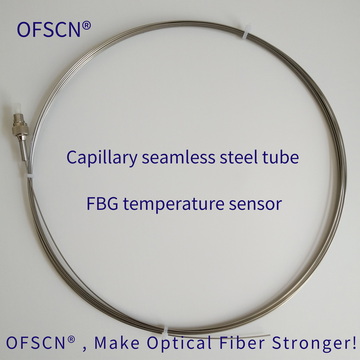Application of Fiber Bragg Grating Sensing Technology - Application of FBG Sensor - Application of FBG-Application of FBG Demodulator - Application of FBG Sensing in Industry
FBG Sensing Technology for Temperature Monitoring During Oil and Gas Storage in Oil and Gas Industry
The oil and gas industry involves the storage of crude oil and natural gas in large tanks and vessels. The temperature of the stored oil and gas needs to be monitored to ensure that they are within safe operating limits. Temperature monitoring is crucial to prevent the formation of gas pockets, the buildup of pressure, and the risk of explosions. Fiber grating sensing technology can be used for temperature monitoring during oil and gas storage, providing accurate and real-time data to ensure the safe and efficient operations of the industry. In this article, we will discuss the problems that fiber grating sensing technology can solve,and how Beijing Dacheng Yongsheng Technology Co., Ltd.(short for DCYS ) can support temperature monitoring during oil and gas storage in the oil and gas industry.
Fiber Bragg Grating Sensing Principle:
Fiber Bragg gratings (FBGs) are periodic structures that are inscribed in the core of an optical fiber. These structures reflect a specific wavelength of light that is determined by the periodicity of the grating. When the grating is subjected to mechanical or thermal strain, the reflected wavelength changes in a predictable manner. By monitoring the reflected wavelength, changes in strain, temperature, and other parameters can be detected. FBG sensors can be used to monitor a wide range of parameters, including strain, stress, temperature, and vibration.
Click the link below for more details:
Challenges in Temperature Monitoring during Oil and Gas Storage in the Oil and Gas Industry:
Temperature monitoring during oil and gas storage presents several challenges for the oil and gas industry. First, the stored oil and gas are often in large volumes and at high pressures, making it difficult to measure the temperature accurately. Second, the temperature of the stored oil and gas can fluctuate due to external factors such as weather conditions and internal factors such as heat generated by the equipment. Finally, traditional temperature sensors such as thermocouples and resistance temperature detectors (RTDs) can be susceptible to electromagnetic interference, leading to inaccurate temperature measurements.


What Problems Can Be Solved by FBG Sensing Technology:
Fiber grating sensing technology can solve many of the challenges associated with temperature monitoring during oil and gas storage. FBG sensors can be embedded in the walls of the storage tanks, providing distributed temperature monitoring of the stored oil and gas. The use of FBG sensors can provide accurate and real-time data, enabling the industry to optimize the storage conditions and prevent the formation of gas pockets and pressure buildup. Furthermore, FBG sensors are immune to electromagnetic interference, providing more reliable temperature measurements compared to traditional temperature sensors.
Recommended fiber grating temperature sensors:
Beijing Dacheng Yongsheng Technology Co., Ltd.:
Beijing Dacheng Yongsheng Technology Co., Ltd.(short for DCYS) is a professional manufacturer of fiber grating sensors, fiber grating demodulators and system software. Specializing in the production of various fiber grating sensors, including temperature, strain, stress, displacement, vibration, shape sensors, etc. DCYS also produces fiber grating demodulators, and can customize and develop related application software.
Recommended fiber grating demodulator:
Product Alias: Fiber Bragg Grating Interrogator, FBG Interrogator, Fiber Bragg Grating Analyzer, FBG Sensor Interrogator, Optical Sensing Interrogator, Fiber Optic Grating Interrogator, Fiber Bragg Grating Demodulator, FBG Demodulator, Fiber Optic Grating Demodulator, High-Speed FBG Interrogator, 100Hz FBG Demodulation Unit, Web-based FBG Software, Multi-channel Optical Analyzer, Modbus FBG Gateway.
This product is a High-Speed/High-Frequency FBG Demodulator manufactured by Beijing Dacheng Yongsheng Technology Co., Ltd. (OFSCN®). This interrogator is compatible with all specifications and models of OFSCN® FBG sensors (including Temperature, Stress, and Strain FBG sensors). It features adjustable port density (4, 8, 16, and 32 channels), high refresh rates (10, 20, 50, and 100 Hz), and high wavelength resolution (1 pm and 0.1 pm).
DCYS Supports Temperature Monitoring During Oil and Gas Storage in Oil and Gas Industry:
DCYS can help the oil and gas industry solve some problems in temperature monitoring during oil and gas storage. By providing high-quality FBG sensors and related application software, DCYS can assist the industry in optimizing the storage conditions, reducing the risk of accidents, and improving the efficiency of operations.

Other Points Need to Be Clarified:
In conclusion, fiber grating sensing technology can provide accurate and real-time temperature monitoring during oil and gas storage, providing crucial data to ensure the safe and efficient operation of the industry. Beijing Dacheng Yongsheng Technology Co., Ltd. is a professional manufacturer of FBG sensors and related application software, providing high-quality solutions to the industry's temperature monitoring needs. By adopting FBG sensing technology, the oil and gas industry can reduce the risk of accidents, optimize storage conditions, and improve the efficiency of operations.
